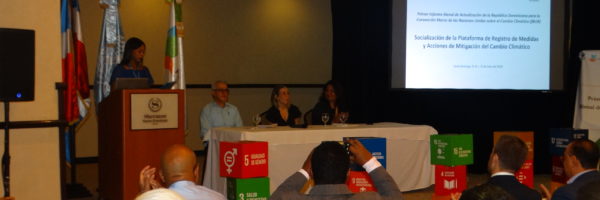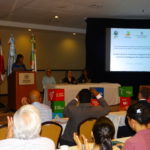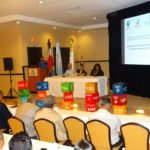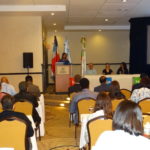Dominican Government With UNDP Support Present Public Platform to Register Local Climate Change Initiatives

Santo Domingo, July 25, 2019 – The Dominican Republic is the first nation in the Caribbean to introduce a unique system that will register all initiatives that are being worked on locally to mitigate climate change. The system is being carried out through a virtual platform that will allow users to follow the efforts that are currently in place nationwide by the productive sectors to reduce greenhouse gases.
The National Registry Platform to Measure Actions on the Mitigation of Climate Change is a joint initiative by the Ministry of the Environment, the National Council on Climate Change, with the support of the U.N. Development Program. The goal is to establish a unique registry system, at the national level, on the initiatives being carried out to mitigate climate change in the Dominican Republic.
The system will emphasize the projects being carried out by the private sector and will generate additional information at all levels, including the municipal levels.
The system was launched during an event headed by the Vice Minister of International Affairs and Cooperation of the Ministry of the Environment, Patricia Abreu; the Technical Director of the National Council on Climate Change, Moisés Alvarez; and the Director of the UNDP’s Sustainable and Resiliency Environmental Unit, María Eugenia Morales.
The National Registry on Measures and Actions to Mitigate Climate Change is part of the actions being carried out to present the First Updated Biennial Report before the U.N. Convention for Climate Change.
“With this technology, we are going one step further. The system will let us know how the local projects are functioning, how these programs can reduce emissions, and in what regions of the D.R. they are being carried out. This is very important because the more information we have we will know if we are meeting the commitments made through the Paris Agreement. At the same time, we will be able to know which sectors will need more support from the Ministry of the Environment to develop,” explained Vice Minister Patricia Abreu during the launching event held in a Santo Domingo hotel.
The First Biennial Report is part of a country process that has already being updated by the National Inventory on the Impact of Greenhouse Gases by using 2015 data. Also, information obtained through the mitigation actions carried out, the needs pending and the support received from various sources.
Currently, the Biennial Report is concentrating in presenting the advances made by the Dominican Republic in the promotion, development, implementation and execution of actions that will contribute to mitigate and adapt to climate change at the national level.
This virtual tool is one of the innovative systems introduced by the Biennial Report project, which complements the efforts carried out by public institutions and the private sector in order to strengthen the national capacities in relation to the national goals established to reduce greenhouse gases. Also, contribute with actions that will meet the commitments established in the National Development Strategy where the Dominican Republic determined to reduce by 25% these emissions by the year 2030.
At the same time, Moisés Álvarez, Technical Director of the Council on Climate Change highlighted that this same commitment is part of the Determined National Proposal presented by the Dominican Republic as part of the Paris Agreement.
Álvarez also indicated during his opening remarks that until now the country has presented three National Communication Documents to the Convention on Climate Change. He also explained that the country will soon be presenting the First Biennial Report.
“This system that we introduce today is part of the commitments undertaken by the country during the Paris Agreement. This platform will allow us to register all the actions and projects that are being implemented or carried out in the country to reduce environmental pollution and that mitigate the gases that are responsible for global warming. It will also identify other national systems, such as international financing in the climate sector and public investment.”
During the opening event the attending audience was able to see how the system operates, was designed, its goals and implications in the National Mitigation Registry. At the same time, it showed how it will work in regards to the registry of the reduction in the levels of greenhouse gases.
“This is a complete tool that will allow us to monitor the reduction of the emissions. But it will also be flexible enough to integrate actions that will improve and help meet the goals established by the National Commission,” explained Ms. María Eugenia Morales from the UNDP.
This system is part of the actions that the Ministry of the Environment and the National Council on Climate Change, with the support of the UNDP and the U.N. Convention for Climate Change, has introduced to present the First Biennial Report on Greenhouse Gases.

Related News
-

(Versión en español) MINC realiza el evento "Enamórate del Arte y la Cultura" en Los Alcarrizos
-

(Versión en español) InspireDR celebra una década de impacto con “La Fiesta 10” en Cabarete
-

(Versión en español) Organización “Juventud Hablemos” de la Universidad de Columbia y la GFDD copatrocinan a casa llena evento sobre “La evolución de la democracia en la República Dominicana”
-

(Versión en español) Realizan premiere del documental “El Padrino II: 50 años y su filmación en República Dominicana”
-

Actividad #1
Dónde:: Complejo Acuático Del Centro Olímpico Juan Pablo Duarte.
Días: 28 y 29 de noviembre 2016.
Precios: RD$1,1000.00 VIP, RD$600.00 gradas.




